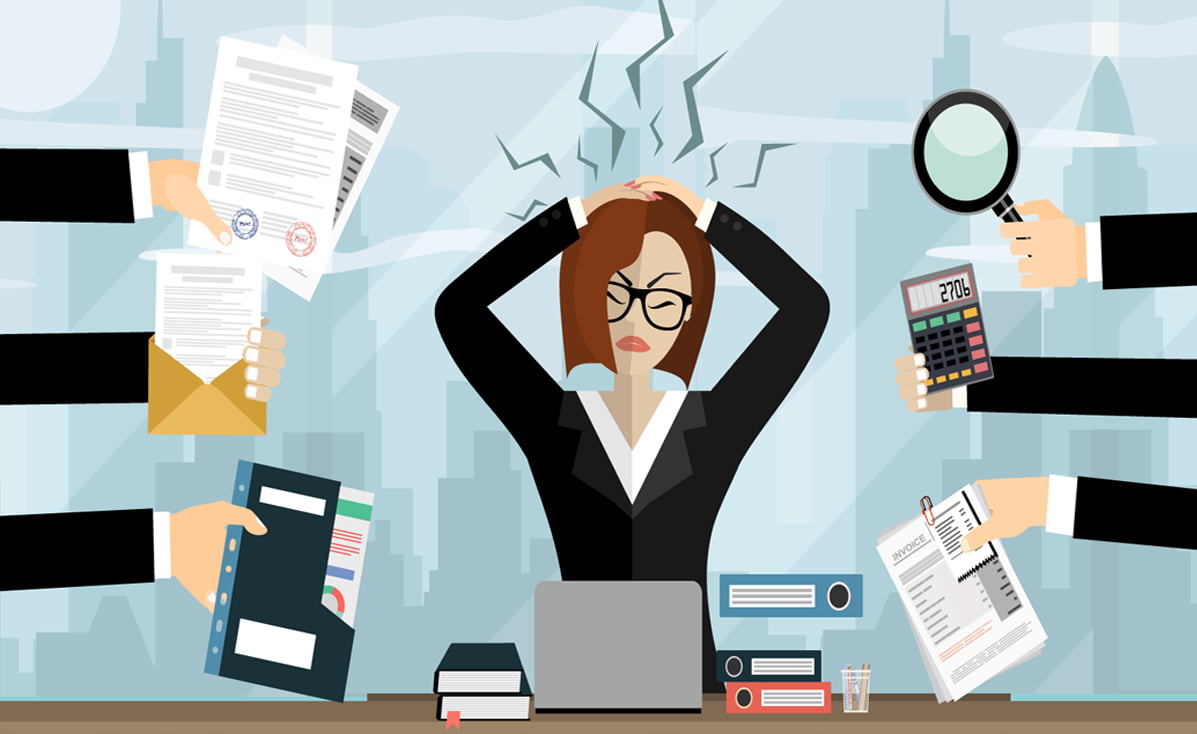Studies have demonstrated that most of the world population suffer stress when working, depending on how demanding their jobs are. If you start to notice some symptoms that may have a relation with this feeling, it will be good for your health to learn how to manage stress in your workplace.
Stress is a natural response of the human body when a tedious situation is happening around us. However, it is not healthy when it becomes frequent and stronger as the days pass. In this article, you will learn everything you need to know about workplace stress and the different ways you can manage it. Let’s observe:
- What is exactly stress at work?
- What elements can cause stress in your workplace?
- What are the symptoms of this illness as it starts to increase?
- How does stress affect your work skills in your workplace?
- Tips to learn how to manage and reduce stress in your workplace
- How can Connect Resources help you when it comes to stress management?
1. What is exactly stress at work?
Stress is a feeling result of a situation given by the interaction between the individual and the situation happening around him/her. In the case of workplace stress, it can emerge according to the job’s demands or difficulty level. It is common to feel exhausted sometimes, but if you experience this every day, then it is something you should start taking care of.
In a normal situation, stress can be good for you to stay focused on your job and keep your energy longer. It can be also an advantage since it can help you meet new challenges in your workplace every day. Stress is also useful when something out of the normal happens at work or any other place since it keeps you aware of the situation and helps you avoid danger.
However, you need to know when it is enough stress for one day, and you can realize if you start evaluating yourself every day before, during, and after your work shift. Besides, it will be good to track your moods and changes in your body every day if it is possible. It will help you to know if you are experimenting a great amount of stress or anxiety.
If you think, or if you are sure that the main problem is the workplace itself, then it would be good for your mental health to start looking for a new job. It might not be that easy, but there are many reasons why you should not be afraid of changing your job, starting with the stress factor that causes damage in your body and mind.
Continue reading this article and you will learn more about workplace stress, the ways it can affect your performance at work, and how you can stop stress from increasing and leading you to an alarming health situation. If you learn how to manage stress in your workplace, your life will be easier and happier as long as keep it under control.
2. What elements can cause stress in your workplace?
There are many factors or elements in a workplace that can cause stress or anxiety and make their levels increase exponentially over time, especially when the individual does not pay attention to his/her symptoms and body/mood changes. Stress is caused according to two protective physiological mechanisms, which are:
- The alarm reaction, which is a psychological reaction that comes out when the person is involved in a disturbing situation that represents a threat to the individual’s safety. Physical changes can be experienced, such as tense muscles, panting, and increased heart rhythm. In these dangerous cases, you can either fight or flee, but the stress levels will not decrease until you feel you are safe.
- As for the adaptation mechanism, you can experience stress in new environments, but once these environments become usual places or situations, your body and your mind adapt to them. For example, when you get a new job, your new workplace may cause you some stress because it is an unknown environment for you, but when you get used to it, it will not cause any stress on you anymore.
Now let’s see what key factors, actions, or specific situations at your workplace can cause stress. Workplace stress can be the result of these following situations or behaviors:
- A heavy workload is usually the common factor among most of the workers all around the world, and it can be along with long work hours.
- Tight deadlines and working under pressure can increase your stress levels in a short period of time, leading you to terrible consequences.
- If your work is boring and makes you feel unsatisfied can easily cause stress over time.
- Poor relationships with bosses or colleagues plus harassment and discrimination create an inappropriate working environment that will make you feel insecure and stressed. It may not allow you to perform well in a group discussion.
- Lack of skills, proper resources, or equipment is also related to the most common causes of stress at work.
- Few promotional opportunities may also set you aside from your future aspirations and goals, releasing some stress in your subconscious and making you feel down.
To summarize, you may find many elements that can be potential stressors in your workplace, such as a tedious work environment, bad relationships at work, lack of support, job content and demands, and many others. Personal conflicts also can affect you at work, like traumas, family issues, or any other personal situation.
3. What are the symptoms of this illness as it starts to increase?

As the days pass, your body will start to show you how much stress you have suffered by releasing some symptoms, which can be physical, psychological, or behavioral. In the beginning, these symptoms will not be alarming and will not interrupt you at work, but do not let the stress levels increase, or you might start to feel worse every day.
The most common physical stress symptoms related to workplace stress might be fatigue, insomnia, headache, heart palpitations, muscular tension, gastrointestinal upsets (including diarrhea or constipation), dermatological disorders (like acne), and more. As for psychological symptoms, the usual ones are anxiety, irritability, depression, discouragement, pessimism, overwhelmed feelings, and cognitive difficulties (unable to concentrate or make decisions).
The higher your stress levels are, the more symptoms you will experience in your workplace. Your behavior towards you and other people will be visible, including lack of interest, isolation, mood swings, interpersonal relationship problems, aggression, a drop in work performance and creativity, low tolerance, frustration, impatience, absenteeism, and many others.
If you start to feel any of these symptoms during your work shift, you should start making changes in your life to get rid of them. Every problem has solutions. You only need to focus on them and change those things that make you feel stressed. If the problem is your job or your career, it could be healthy for you to plan your next career move. Keep reading this article to learn more about how to manage the consequences of stress to prevent them from increasing.
4. How does stress affect your work skills in your workplace?
As we mentioned before, stress is a feeling that can modify your body’s functions significantly, and even more when you have already experienced too much workplace stress. Over time, it will start bringing down your work skills and the positive elements you need to work correctly, like confidence or efficiency.
Many of your skills may be reduced if your stress keeps increasing, and you can see it as results of these elements:
- Disorganization in your workplace and your schedule.
- When you get home, you do not have time to share with your family. It is a sign that you have dropped your social and organizational skills.
- Job burnout easily, especially when you do not have a clear role at work and start working in inefficient ways.
- Conflicts become more frequent every day with your colleagues and bosses, reducing your social skills.
- Due to workplace stress, your cognitive skills also can be reduced, such as communication and memory skills.
Many other effects of stress in the workplace will emerge if your stress levels are not reduced in time. Now it is time to move on and see what you can do to fight against workplace stress and make you feel more calmed and satisfied with your job.
If you think you need to change your job, try to consider some points before accepting a new job offer, or you might regret it eventually.
5. Tips to learn how to manage and reduce stress in your workplace
Before starting with the tips and the creative ways to reduce stress at work, you need to understand some things if you really want to be able to manage it.
5.1. Things you need to understand to be able to manage stress
- Since stress is a natural way that our body shows to keeps us alive, think of it as what it is, a natural feeling. It is not your fault to feel stressed sometimes. However, it is not good to stay still and do nothing about it.
- Understand the role of the subconscious and conscious mind. If you propose yourself to be positive, it is actually your conscious mind telling the unconscious one what to do. Program yourself to be better and to feel well.
- You need to take care of yourself as if you were a child. Reserve part of your time for yourself and do what you like the most. Slow down your mind and set it free for a moment to release stress.
Now let us see how you can reduce your stress levels to work better:
- Follow an organized schedule since the moment you wake up.
- Set your daily goals clearly and achieve them by using any strategy you feel comfortable with.
- Stay from any conflict you may find in your workplace.
- Do not do multitasking, focus on each task at a time.
- Walk or do exercise in your time to release tension.
- Your body needs a healthy diet to keep working correctly. Minimize sugars and refined carbs. Do not consume caffeine, alcohol, or fats excessively. Try to avoid nicotine if possible.
- Listen to your favorite music whenever you feel like it, especially after your work shift.
- If you need it, lean on your family members or your friends.
If none of these tips work, then we recommend you start looking for a new job with a better environment. Check some tips to be confident in a job interview if you think your stress levels will not make you feel comfortable or confident with your decision.
6. How can Connect Resources help you when it comes to stress management?

Finding help from professionals can help you get through this situation easier and without feeling alone. Besides, you can get some lessons and tips to start learning more about workplace stress management and everything that comes with it.
Connect Resources will help you find experienced healthcare advisors to receive more information and facts about workplace stress. With their help, you will learn what you need to make your life more relaxed.
If your desire is to change your job, we can also help you find the best job opportunities with a healthy environment included. We will provide you tips and more good things related to this matter, and if a new job does not work, let us make your job research easy and comfortable.
Would you like to contact Connect Resources to learn more about workplace stress management? You can call at +971 433 166 88 or send an email to contact@connectresources.ae, and you will talk to one of their representatives that will gladly answer all of your questions.
Make sure you get the necessary knowledge to help yourself when it comes to this matter, and then you will surely be happier in your workplace.







